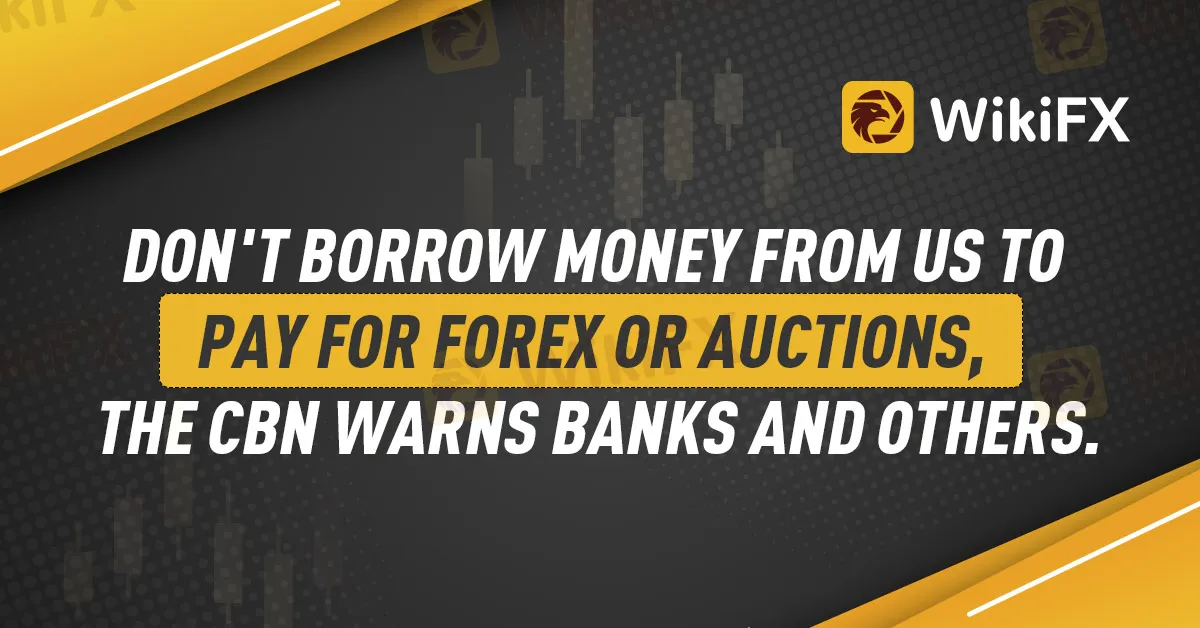简体中文
繁體中文
English
Pусский
日本語
ภาษาไทย
Tiếng Việt
Bahasa Indonesia
Español
हिन्दी
Filippiiniläinen
Français
Deutsch
Português
Türkçe
한국어
العربية
DON'T BORROW MONEY FROM US TO PAY FOR FOREX OR AUCTIONS, THE CBN WARNS BANKS AND OTHERS.
Abstract:The Central Bank of Nigeria (CBN) has issued a warning to commercial banks and authorized sellers not to exploit its low-cost home windows, Treasury Payments, and Open Market Operations auctions in order to finance international trade.

The Central Bank of Nigeria (CBN) has issued a warning to commercial banks and authorized sellers not to exploit its low-cost home windows, Treasury Payments, and Open Market Operations auctions in order to finance international trade.
In a circular published by the CBN Director of the Monetary Market Division, Angela Sere-Ejembi, this was made known to authorized dealers. The notice on admission to the CBN low-cost windows said that some authorized dealers hadn't been abiding by the rules based on its circulars dated August 1, 2012 and August 8, 2016 that were referred as FMD/DIR/GEN GIR/03/006 and FMD/DIR/GEN/CIR/07/005, respectively.
The Standing Automated Repo Conversion (AREPO), Funding for Liquidity Facility (FfLF), and Tenored Repurchase Transactions are all included in the CBN low-cost window (REPO).
For Open Market, successful bids on the Open Market Operations (OMO) auctions are to refrain from accessing the low-cost window on the public sale date, according to the most recent round released over the weekend. Failure to comply will result in the cancellation of allocation.
The CBN stated that the time was right for the banks to source their foreign exchange by providing entrepreneurs with ideas, skills, to make them responsive and draw FX to Nigeria when it announced the launch of what it named The RT200 Programme.
CBN Governor Godwin Emefiele said this during the Bankers' Committee press conference on Thursday.
The experts emphasized that there is no short cut to attracting foreign direct investment, recalling earlier advice they gave to the government that halting forex payments to bureau de change operators alone will not save the naira and that a comprehensive approach, including holding banks accountable, is necessary to find a solution.
Emefiele responded that banks would assist the program when asked about their roles in the new policy and the CBN will put an end to the dollar sales era by this year.
According to him, banks should obtain export revenues from exporters to provide their clients with (importers).
According to experts, the new CBN strategy, if successfully implemented, would lessen pressure on the naira, improve exports, draw foreign investment to the nation, and open up job prospects for the populace.
The new policy, according to him, will be supported by five major pillars: a value-added export facility; an expansion facility for non-oil commodities; a non-oil FX rebate program; specialized non-oil export ports; and a biannual non-oil export summit.
In addition, it stated that sellers with successful bids on the government securities auctions (e.g., Nigerian Treasury Bonds (NTBs), Federal Government of Nigeria (FGN) Bonds, and Sukuk) should not be authorized to join the CBN low-cost window on the settlement date. On the date of SLF, FfLF, and REPO will not be accepted. AREPO and conversion of Intraday Liquidity Facility (IDF) to FfLF on the settlement date, in addition to functioning REPO shall lure a penal cost of 5 per cent (5.00%) flat on the allotment value.
On the dates of each public sale and transaction, individuals with profitable overseas trade bids and transactions are not to enter the low-cost window. Failure to comply will result in the cancellation.
This Round strikes with immediate force. Accordingly, all authorized vendors will comply.

Disclaimer:
The views in this article only represent the author's personal views, and do not constitute investment advice on this platform. This platform does not guarantee the accuracy, completeness and timeliness of the information in the article, and will not be liable for any loss caused by the use of or reliance on the information in the article.
Read more

Trump Administration Pushes for CFTC to Lead Crypto Regulation
The Trump team proposes shifting crypto regulation from the SEC to the CFTC, aiming to spur innovation in the $3T digital asset market. Find out what's at stake.

Smart Prop Trader to Close Doors in December 2024
Smart Prop Trader, a proprietary trading firm known for offering funded trading accounts, has announced plans to cease onboarding new traders as it prepares to wind down operations by the end of the year.

Filipino Investment Scam Fugitive Deported from Indonesia
Hector Aldwin Pantollana, a Filipino investment scam suspect, is deported from Indonesia after scamming millions. Authorities vow justice for the victims.

XM Group: A Leading Multi-Asset Broker Honored for Exceptional Customer Experience and Service
XM Group, operating under the entity name XM Global Limited, has emerged as a prominent force in the global forex and derivatives trading industry, boasting over 15 million clients worldwide. Since its inception in 2009, XM has evolved into a reputable multi-asset broker, offering an extensive range of more than 1400 trading instruments across 10 asset classes. With a strong emphasis on corporate values, innovative technology, and exceptional customer service, XM has established itself as a true industry leader.
WikiFX Broker
Latest News
Philippine Banks Launch PHPX Stablecoin to Transform Payments
Broker Review: Is FOREX.com a solid Broker?
Tether to Discontinue EURt Stablecoin Amid Regulatory Shifts in Europe
Adani’s Bribery Scandal! SEC Charges, Major Fallout & Adani’s Stand
Unleash Your Trading Skills: Join the WikiFX KOL India Trading Competition!
NAGA Adds UAE, Saudi Stocks to Platform with Zero Commissions
ED uncovered 106 Crore "Nagaland Crypto Scam"
Smart Prop Trader to Close Doors in December 2024
Meme Coins: Fleeting Fortune or Financial Folly?
Philippine Scam Ring Targets Aussie Men with Fake Crypto Offers
Currency Calculator


